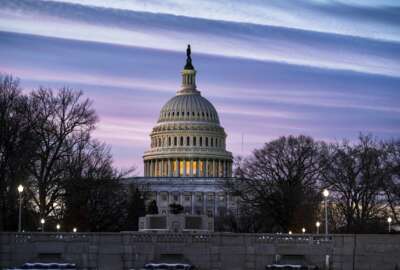Coming at you in fiscal 2015: Highlights of the omnibus
What federal employees should know about the $1 trillion, 1,603-page spending bill for fiscal 2015.
The $1.014 trillion omnibus legislation that the House is expected to vote on Thursday, and the Senate soon after, will fund the government through September 2015. Funding runs out at 12:01 a.m. Friday. Assuming this bill becomes law, federal employees can take a collective breath. You know what the next 9 1/2 months are going to look like (unless you work at the Department of Homeland Security).
“This agreement means no government shutdown and no government on autopilot. In today’s era of slamdown politics, we were able to set aside our differences,” said Senate Appropriations Committee Chairwoman Barbara Mikulski (D-Md.) in a written statement.
In other words, the bill is a compromise, achieved through hard-core negotiations by top Democrats and Republicans, which is what they’re supposed to do on Capitol Hill.
Under the bill, blue-collar and General Schedule employees would receive a 1- percent pay raise. So would the military.
That’s the good news.
The bad news? Negotiators maintained the spending ceiling set by the bipartisan deal that ended last year’s government shutdown. Some trade-offs hit agencies hard when they’re already down. The EPA, for example, has just gotten past a hiring freeze. Under this bill, it will lose $61 million. House Republicans anticipate the agency will have to reduce staffing to its lowest level since 1989, leading the National Treasury Employees Union, which represents EPA employees, to call the budget “misguided.” Those job candidates might decide they’re better off elsewhere.
The IRS, too, suffers under this bill. Its budget would be cut by roughly 3 percent to $10.9 billion. The IRS already has felt the fury of Republican lawmakers upset about the agency’s alleged targeting of conservative groups. Its budget has been cut by nearly 10 percent since fiscal 2010. Staffing levels are 26 percent below the number of employees the agency had 18 years ago, according to NTEU.
“These continuing cuts are crippling the IRS and costing the government billions of dollars in lost revenue,” said NTEU President Colleen Kelley in a written statement. “This is short-sighted, politically driven budgeting.”
DHS employees got the short end of the stick as well. The bill funds the department with a continuing resolution through February. At that time, Republicans may have a better chance of stripping money from homeland security offices key to implementing President Barack Obama’s immigration agenda.
And all office-bound feds may have to get used to dingy walls or cracking ceilings. The bill strips $262 million out of the General Services Administration’s fund for acquiring and maintaining buildings.
Here are a few more highlights of the 1,603-page legislation:
The winners: scientists
The EPA notwithstanding, science agencies fare well in the bill. The National Institutes of Health gets a healthy boost for operations and $238 million more for research on the Ebola virus. The Centers for Disease Control and Prevention, the Food and Drug Administration and Defense Department researchers also get a slice of the $2.7 billion set aside to fight Ebola and other infectious diseases.
NASA, the National Science Foundation and the National Institute of Science and Technology also would see increases over fiscal 2014. The National Weather Service and the National Oceanic and Atmospheric Administration get bumps to improve weather forecasting and keep major weather satellite programs on track.
And speaking of health, the bill maintains fiscal 2014 funding for Obamacare.
The other winners: auditors
Auditors, overall, will like this legislation too. Many inspectors general and the Government Accountability Office would receive more money to hire staff and conduct investigations. The Veterans Affairs inspector general, in particular, would get an additional $5 million to continue examining the long wait times for appointments at VA health centers.
Adding some muscle to inspectors general’s pleas for management reforms, the legislation would require agencies to explain how they will solve their top challenges, as identified by their inspectors general, in their fiscal 2016 budget requests.
Elsewhere, the bill doubles funding for fraud control at the Centers for Medicare and Medicaid Services, to $672 million. The Social Security Administration receives $199 million more to monitor disability and benefits payments.
Finally, the legislation attempts to limit spending on what Mikulski has dubbed “techno-boondoggles.” Agencies would have to notify Congress whenever major technology projects exceed their projected cost by 10 percent.
Conferences and stuff
Say goodbye to SWAG, as if there’s any still left. The bill would maintain fiscal 2014 limits on meetings, receptions, conferences and the accompanying promotional items. Agencies could not send more than 50 employees to international meetings. The bill requires agencies to report conference spending to their inspector general.
The bill also prohibits spending on official portraits.
Contracting
The legislation would continue the long-standing prohibition on A-76 competitions between federal agencies and contractors over the same work. It also would forbid agencies, in most cases, from contracting with firms that have committed felonies or not paid their taxes.
Defense
The bill proposes 832 individual cuts to the Defense Department’s bottom line, according to Senate appropriators. Civilian workers may feel the pain from $660 million in cuts to civilian personnel budgets, made on the theory that the Defense Department overestimated the number of employees it needs in fiscal 2015.
The department’s program for training acquisition staff also would take a big hit. The bill would put just $83 million into the Defense Acquisition Workforce Development Fund, less than half of what the department requested.
The department would receive the bulk of $5 billion to fight Islamic State militants in Syria and Iraq as part of a $64 billion overseas contingency fund.
Veterans Affairs
The bill would give $2.5 billion to the Veterans Benefits Administration to tackle a backlog of disability claims. With the money, VA would be expected to hire more claims administrators and upgrade its technology to wean itself away from the clunky paper-based system it has now.
The measure also directs the congressionally charted National Academy of Public Administration to study the VBA’s system with an eye toward preventing future backlogs.
The bill includes $4.6 billion to improve health care for female veterans, which VA Secretary Bob McDonald has admitted is uneven across VA centers. The bill requires the department to count the number of women’s health specialists in its system.
Embassy Security
The measure includes $5.4 billion to upgrade security of U.S. missions overseas. That’s enough to fulfill all the recommendations made by the Benghazi Accountability Review Board following the 2012 attack on the U.S. compound in that Libyan city.
RELATED STORIES:
Lawmakers agree on $1.1 trillion spending bill
Copyright © 2025 Federal News Network. All rights reserved. This website is not intended for users located within the European Economic Area.





